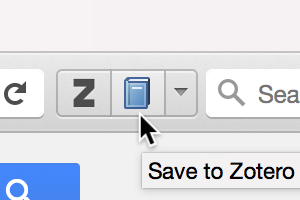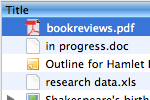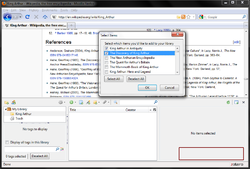Grab your research with a single click.

A personal research assistant.
Zotero is the only research tool that automatically senses content, allowing you to add it to your personal library with a single click. Whether you're searching for a preprint on arXiv.org, a journal article from JSTOR, a news story from the New York Times, or a book from your university library catalog, Zotero has you covered with support for thousands of sites.
Store anything.
Zotero collects all your research in a single, searchable interface. You can add PDFs, images, audio and video files, snapshots of web pages, and really anything else. Zotero automatically indexes the full-text content of your library, enabling you to find exactly what you're looking for with just a few keystrokes.Zotero
From Wikipedia, the free encyclopedia
| zotero | |
 Zotero detecting bibliographic information from embedded COinS on a Wikipedia page | |
| Developer(s) | Center for History and New Media (CHNM) at George Mason University(GMU) |
|---|---|
| Initial release | October 8, 2006 |
| Stable release | 4.0.8[1] (May 2, 2013) [±] |
| Written in | JavaScript with SQLitebackend |
| Operating system | Cross-platform |
| Type | Reference management software |
| License | AGPL[2] |
| Website | Zotero |
Zotero /zoʊˈtɛroʊ/ is free and open-source reference management software to manage bibliographic data and related research materials (such as PDF files). Notable features include web browser integration, online syncing, generation of in-text citations, footnotes and bibliographies, as well as integration with the word processors Microsoft Word, LibreOffice, OpenOffice.org Writer and NeoOffice. It is produced by the Center for History and New Media of George Mason University (GMU).
Contents[hide] |
History[edit]
Zotero 1.0[edit]
The first release of Zotero, 1.0.0b2.r1, was made available in October 2006 as an add-on for the Firefox web browser. Development of Zotero 1.0.x continued until May 2009, when Zotero 1.0.10 was released.
EndNote lawsuit[edit]
In 2008, Thomson Reuters sued the Commonwealth of Virginia and George Mason University, based on the claim that Zotero's developers had, in violation of the EndNote EULA, reverse-engineered EndNote and provided Zotero with the ability to convert EndNote's proprietary .ens styles into Citation Style Language styles.[3] George Mason University responded that they would not renew their site license for EndNote and that "anything created by users of Zotero belongs to those users, and that it should be as easy as possible for Zotero users to move to and from the software as they wish, without friction".[4] The journal Nature editorialized that "the virtues of interoperability and easy data-sharing among researchers are worth restating. Imagine if Microsoft Word or Excel files could be opened and saved only in these proprietary formats, for example. It would be impossible for OpenOffice and other such software to read and save these files using open standards—as they can legally do." [5]
The case was dismissed on June 4, 2009 due to a lack of jurisdiction.[6] Although the Virginia Supreme Court granted an appeal to Thomson Reuters in this case on December 18, 2009, the appeal was withdrawn on January 11, 2011.
Zotero 2.0[edit]
Zotero 2.0, released in February 2010, added online features like metadata and file syncing and group libraries, and included a license change from the Educational Community License to GPLv3.[7] Development of Zotero 2.0.x continued until October 2010, when Zotero 2.0.9 was released.
Zotero 2.1[edit]
Zotero 2.1, released in March 2011, adds CSL 1.0 support, Firefox 4 compatibility (the minimum is Firefox 3.6), and Zotero Commons, through which materials can be uploaded to the Internet Archive.
Zotero Standalone[edit]
Zotero Standalone, first released in January 2011, allows Zotero to be run as an independent program outside Firefox. UsingXULRunner, Zotero Standalone is available for Windows, GNU/Linux and Mac OS X. Connectors are available to integrate Zotero Standalone into the web browsers Safari and Chrome.
Zotero 3.0[edit]
Zotero 3.0, released in January 2012, includes the stable release of Zotero Standalone as well as several new major features, including overhauled Word and LibreOffice integration and duplicate detection.
Zotero 4.0[edit]
Zotero 4.0, released in April 2013, includes new features such as automatic journal abbreviations, colored tags, on-demand file syncing.[8]
Features[edit]
On many websites such as library catalogs, PubMed, Google Scholar, Google Books, Amazon.com, Wikipedia, and publisher's websites, Zotero shows an icon when a book, article, or other resource is being viewed. By clicking this icon, the full reference information can be saved to the Zotero library. Zotero can also save a copy of the webpage, or, in the case of academic articles, a copy of the full text PDF. Users can then add notes, tags, attachments, and their own metadata. Selections of the local reference library data can later be exported as formatted bibliographies. Furthermore, all entries including bibliographic information and user-created rich-text memos of the selected articles can be summarized into an HTML report.[9]
Citation formatting[edit]
Zotero users can generate citations and bibliographies through word processor plugins, or directly in Zotero, using Citation Style Language styles. As an open-source software, Zotero allows users to create their own customized citation style.
Product support[edit]
Zotero has no dedicated customer support service, but the Zotero website provides a wealth of information, including instructional screencasts, troubleshooting tips, a list of known issues, and user forums. Questions and issues raised in the forums are answered quickly, with users and developers suggesting solutions.[10]
Etymology[edit]
Financial support and awards[edit]
Development of Zotero has been funded by the Andrew W. Mellon Foundation, the Alfred P. Sloan Foundation, and the Institute of Museum and Library Services, as well as user donations. Zotero has won awards from PC Magazine, Northwestern University's CiteFest competition, and the American Political Science Association.[12]
See also[edit]
- Comparison of reference management software
- Citation Style Language
- CiteProc
- LibX
- ScrapBook – Another Firefox extension having similar capture features but no bibliographic functions
- unAPI
No comments:
Post a Comment